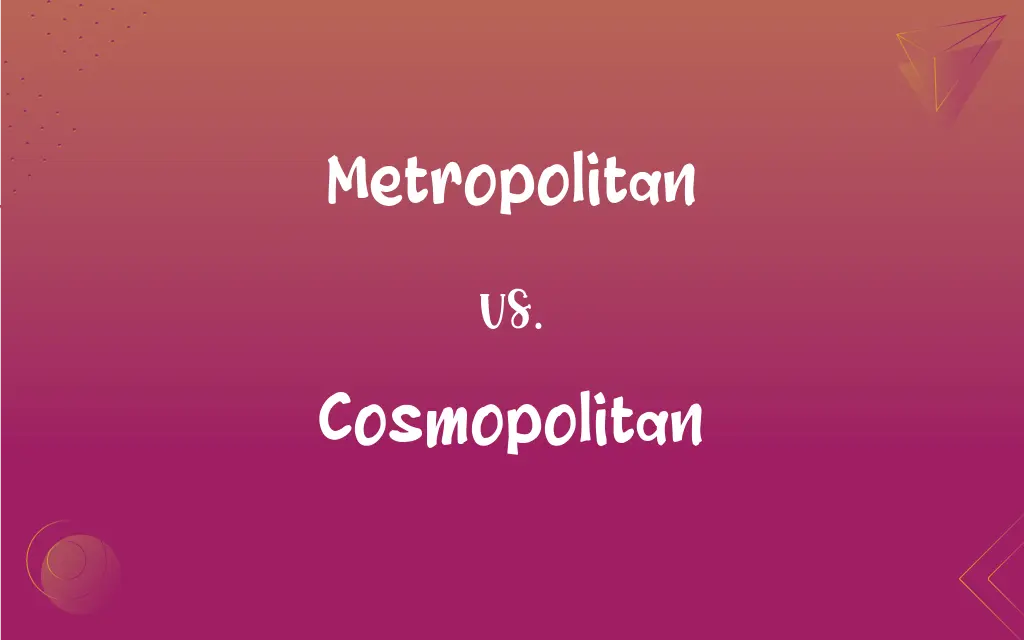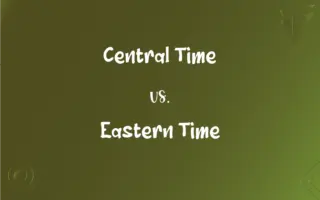Metropolitan vs. Cosmopolitan: What's the Difference?
Edited by Harlon Moss || By Janet White || Published on December 14, 2023
Metropolitan refers to pertaining to a large, densely populated urban area, often the central city in a region. Cosmopolitan refers to characterized by a diverse, international culture and openness to a variety of ideas and lifestyles.

Key Differences
A metropolitan area typically refers to a densely populated urban region that may encompass multiple cities or towns, focusing on the aspect of size and urban structure. In contrast, cosmopolitan describes an environment or attitude that is worldly, diverse, and open to various cultures and ideas.
Metropolitan areas are often centers of economic, political, and social activity within a region or country. Cosmopolitanism, however, is more about the cultural and social mindset of an area or a person, reflecting inclusivity and international influences.
The term metropolitan can also imply a connection to the central areas of a large city, often with implications of urban lifestyle and infrastructure. Cosmopolitan, on the other hand, suggests a mix of cultures and global influences, not limited by geography but more by attitude and diversity.
Metropolitan areas often have a significant impact on their surrounding regions, influencing commuting patterns, economic trends, and regional policies. Cosmopolitan places or people exhibit an openness to different lifestyles, cuisines, arts, and beliefs, transcending local boundaries.
Metropolitan refers more to a physical space and its characteristics, while cosmopolitan refers to the character and culture of a place or person, emphasizing global awareness and cultural sophistication.
ADVERTISEMENT
Comparison Chart
Definition
Large urban area, central city in a region
Diverse, international culture and openness
Focus
Urban structure, size, economy
Cultural diversity, worldliness
Geographic Implication
Tied to a specific urban region
Not limited by geography, global in nature
Cultural Aspect
Urban lifestyle and infrastructure
Inclusivity of various lifestyles and ideas
Societal Influence
Regional economic and policy impact
Personal or area's openness to global influences
ADVERTISEMENT
Metropolitan and Cosmopolitan Definitions
Metropolitan
Relating to a large urban area.
The metropolitan area's population has grown significantly.
Cosmopolitan
Worldly and sophisticated.
He has a cosmopolitan taste in food and art.
Metropolitan
Associated with the characteristics of a city.
Metropolitan areas often have diverse job opportunities.
Cosmopolitan
Inclusive of various ethnic and cultural elements.
The festival was a celebration of cosmopolitan diversity.
Metropolitan
Encompassing a central city and its suburbs.
The metropolitan region extends beyond the city limits.
Cosmopolitan
Open to different ideas and lifestyles.
A cosmopolitan society welcomes diverse cultures.
Metropolitan
Belonging to a major city.
He enjoys the fast-paced metropolitan lifestyle.
Cosmopolitan
Reflecting a mix of cultures and international influences.
Her cosmopolitan outlook was shaped by years of travel.
Metropolitan
Urban in nature, with high population density.
Metropolitan life is vibrant and bustling.
Cosmopolitan
Not limited to local or national boundaries.
Cosmopolitan cities attract global tourists.
Metropolitan
Of, relating to, or characteristic of a major city
Crowded metropolitan streets.
A metropolitan newspaper.
Cosmopolitan
Pertinent or common to the whole world
An issue of cosmopolitan import.
Metropolitan
Of or constituting a large city or urbanized area, including adjacent suburbs and towns
The Dallas-Fort Worth metropolitan area.
A metropolitan county.
Cosmopolitan
Having constituent elements from all over the world or from many different parts of the world
The ancient and cosmopolitan societies of Syria and Egypt.
FAQs
Are all metropolitan areas also cosmopolitan?
Not necessarily, while metropolitan areas are large urban spaces, they may not always be culturally diverse or cosmopolitan.
What defines a metropolitan area?
A metropolitan area is a large urban space, often including a central city and its suburbs.
Is metropolitan status based on population size?
Yes, metropolitan areas are typically defined by their large population size and urban structure.
Do metropolitan areas influence surrounding regions?
Yes, metropolitan areas often impact surrounding regions economically, socially, and politically.
Can a small city be cosmopolitan?
Yes, even small cities can be cosmopolitan if they embody cultural diversity and openness.
How do metropolitan areas affect lifestyle?
Metropolitan areas often offer a faster-paced, diverse urban lifestyle with various amenities and opportunities.
What does cosmopolitan mean?
Cosmopolitan refers to a culture or attitude that is worldly, diverse, and open to various ideas and lifestyles.
Does being cosmopolitan imply international travel?
While travel can contribute, cosmopolitanism is more about a mindset of embracing cultural diversity and global perspectives.
Can individuals be described as cosmopolitan?
Yes, individuals with a broad, diverse cultural perspective and openness to the world can be described as cosmopolitan.
Are metropolitan areas limited to specific geographic locations?
While typically centered around a large city, a metropolitan area can extend into surrounding towns and suburbs.
Does cosmopolitanism affect local culture?
Yes, cosmopolitanism can enrich local culture by integrating diverse global elements.
Is a cosmopolitan attitude beneficial in today’s world?
A cosmopolitan attitude can be beneficial in fostering understanding, tolerance, and appreciation of global diversity.
Can a metropolitan area be culturally homogeneous?
Yes, it's possible for a metropolitan area to be culturally homogeneous, though many are diverse.
Do metropolitan areas have diverse job markets?
Typically, metropolitan areas have diverse job markets with a range of industries and sectors.
Can cosmopolitan environments enhance creativity?
Cosmopolitan environments can enhance creativity by exposing individuals to a variety of perspectives and ideas.
How does cosmopolitanism influence cuisine?
Cosmopolitanism leads to a diverse range of culinary influences and international cuisine availability.
Are business opportunities greater in metropolitan areas?
Generally, metropolitan areas offer more diverse business opportunities and resources.
Is transportation infrastructure better in metropolitan areas?
Metropolitan areas often have more developed transportation infrastructure due to higher population and demand.
Does cosmopolitanism contribute to globalization?
Yes, cosmopolitanism contributes to globalization by promoting cross-cultural connections and global awareness.
Does cosmopolitanism promote cultural exchange?
Yes, cosmopolitanism encourages cultural exchange and global understanding.
About Author
Written by
Janet WhiteJanet White has been an esteemed writer and blogger for Difference Wiki. Holding a Master's degree in Science and Medical Journalism from the prestigious Boston University, she has consistently demonstrated her expertise and passion for her field. When she's not immersed in her work, Janet relishes her time exercising, delving into a good book, and cherishing moments with friends and family.
Edited by
Harlon MossHarlon is a seasoned quality moderator and accomplished content writer for Difference Wiki. An alumnus of the prestigious University of California, he earned his degree in Computer Science. Leveraging his academic background, Harlon brings a meticulous and informed perspective to his work, ensuring content accuracy and excellence.







































































